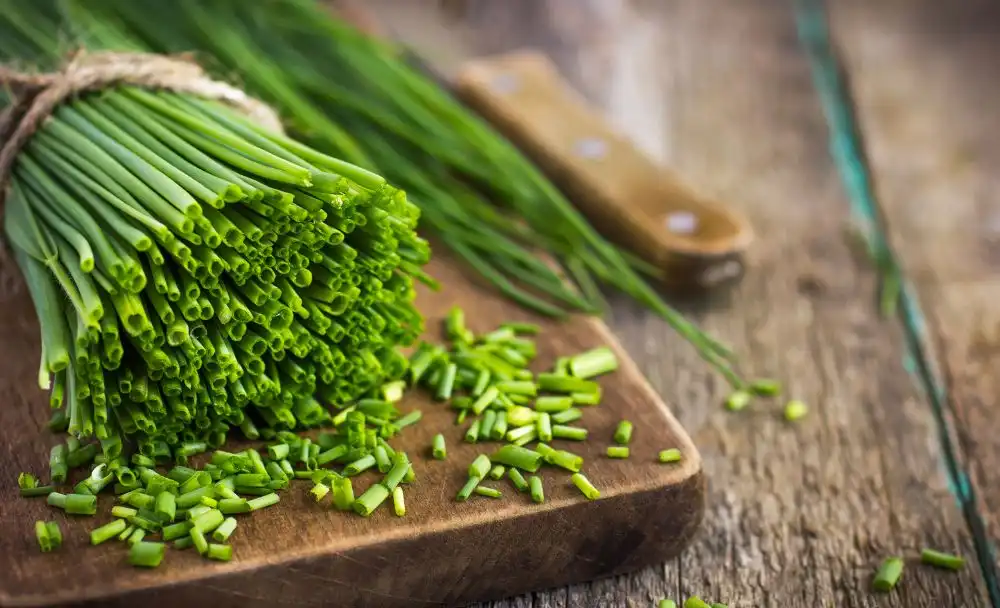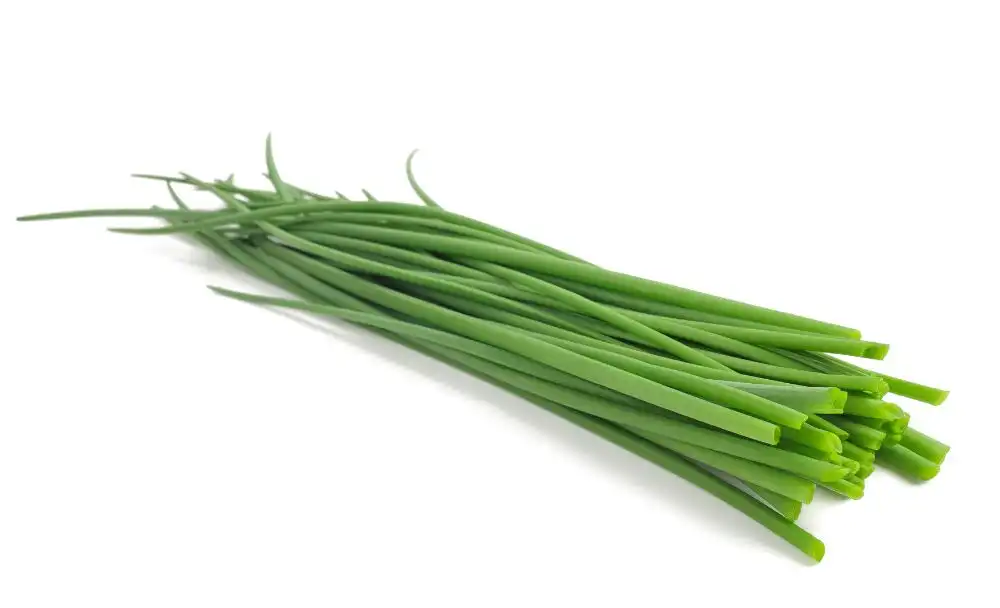This article is reviewed by an expert

Chives are a popular herb known for their mild onion flavour. They belong to the same family as onions, garlic, and leeks, and they are commonly used in cooking to add a subtle onion-like taste to dishes. This makes them a good alternative for flavouring for anyone who cannot consume onions. Chives are characterized by their long, slender green leaves, and they are available fresh in most grocery stores or can be easily grown in a home garden. In case you were wondering, chives and garlic chives are not identical although they are more popular in India and only have subtle differences. While regular chives add an onion flavour, garlic chives add a garlic flavour to food.
Chives Benefits
- Antioxidant Benefits
Chives contain antioxidants, such as quercetin and kaempferol, which help neutralize harmful free radicals and reduce oxidative stress in the body 1. These benefits can be obtained from any variety of chives, whether onion or garlic chives.
- Anti-Inflammatory Effects
Chives have anti-inflammatory properties that may help reduce inflammation in the body. Research shows that these benefits are a result of reduced nitro-oxidative stress which in turn inhibits phagocytosis 2.
- Immune Support
The high vitamin C content in chives supports a healthy immune system and may help protect against infections and illnesses. The same study that observed anti-inflammatory benefits also found that chives exhibit strong antimicrobial and antifungal properties 2.
- Digestive Health
One of the main chives benefits that is alluded to in Ayurveda is with regard to digestion. The herb is highly recommended for healthy digestion, which is supported by modern knowledge of its fibre content and compounds that could alleviate gas and bloating.
- Cardiovascular Health
Antioxidants such as quercetin and allicin are the main source of chives benefits, which are not surprisingly common to onions and garlic. These ingredients have been shown to protect the heart through various mechanisms, including gut microbiota modulation and prevention of myocarditis or heart inflammation, as well as cholesterol and blood pressure reduction 3,4.
- Bone Health
Chives are a good source of important minerals such as calcium, magnesium, zinc and copper, making them important for musculoskeletal health 5. However, as chives may only be used as garnishing, it cannot be a primary source of such nutrients.
- Potential Anti-Cancer Effects
Some studies suggest that certain compounds found in chives, such as allyl sulphides, may have anti-cancer properties, protecting against specific types of cancer such as gastrointestinal cancer 6. Another study also found that allium family foods like garlic and leeks protected women from breast cancer 7.

- Respiratory Health
Like garlic and onions, chives have also been used traditionally to soothe respiratory issues and may help alleviate symptoms of coughs and congestion.
- Weight Management
Chives are low in calories and can be a healthy addition to a weight management plan as they add a rich flavour to otherwise bland but healthy foods like salads, making them more palatable.
- Rich In Nutrients
Chives are a good source of essential nutrients, including vitamins A, C, and K, as well as minerals like calcium, iron, magnesium, and potassium, greatly enriching your diet 5.
Chives Uses
Chives may not feature prominently in traditional Indian recipes, but they have been used in many Indian cuisines, especially in the North East and can be added in a variety of ways in the form of either chives leaves or chive seeds. Here are some of the best ways to enjoy chives in India:
- Fresh Garnish: The most straightforward way to use chives is as a fresh garnish. Simply chop the chives into small pieces and sprinkle them over salads, soups, omelettes, scrambled eggs and baked potatoes. Their mild flavour complements a wide range of dishes.
- Compound Butter: Mix chopped chives with softened butter to create a flavourful compound butter. Spread this mixture over bread, use it to finish grilled meats, or melt it over vegetables for an extra layer of taste.
- Creamy Dips and Sauces: Add chopped chives to creamy dips like sour cream or yogurt-based dips. Chive-infused dips go well with vegetable sticks like cucumber slices, crackers or as a topping for baked potatoes.
- Fish and Seafood: Chives pair wonderfully with fish and seafood dishes. Use them to garnish grilled fish, shrimp or salmon. You can also mix chives into tartar sauce or seafood salads for added flavour.
- Pasta and Risotto: Continental foods have become increasingly popular in India and chives can add a spicy factor while still preserving their authenticity. Sprinkle chopped chives over pasta dishes or stir them into creamy risottos for a burst of freshness and colour.
- Chive Pesto: Create a chive pesto by blending fresh chives, pine nuts or walnuts, garlic, parmesan cheese and olive oil. Use this pesto as a sauce for pasta, grilled vegetables or sandwiches.
- Homemade Dressings: Incorporate chopped chives into homemade salad dressings, chutneys, vinaigrettes or creamy dressings for an extra layer of flavour.
- Chive Infused Oil or Vinegar: Make your own chive-infused oil or vinegar by placing fresh chive sprigs in a bottle of oil or vinegar and letting it infuse for a few weeks. The flavoured oil or vinegar can be used in dressings or as a finishing touch on dishes.
Chives are versatile and can enhance the taste of a wide range of dishes. Because of their mild flavour, they are often used as a complementary herb to other ingredients. Remember that chives are best used fresh, as their delicate flavour diminishes when cooked for extended periods.
Chives Side Effects
Chives are generally safe when used as a culinary herb in moderate amounts as part of a varied diet. There are no specific dosage recommendations for chives, as they are primarily used to add flavour to meals. Typically, most dishes would require no more than a few tablespoons of chopped chives, which would mean that your consumption is also limited to no more than a few tablespoons a week. When used in such a manner chive pose no known risk of side effects.
However, like other herbs, chives should be consumed in moderation. Some people may experience mild stomach upset or digestive issues if they consume large quantities of chives. If you have a known allergy to onions, leeks, or garlic, you should exercise caution when trying chives for the first time, as they belong to the same botanical family.
FAQs
What are some alternatives to chive?
Spring onions, garlic chives and leeks are the closest alternatives to chives and belong to the same family. All of them offer similar nutritional benefits and have variations in flavour.
What are chives called in India?
There is no specific word for true chives in Hindi or Ayurvedic literature, but they are called Hara Pyaz, which literally translates to green onion.
Can I use dried chives instead of fresh?
Dried chives will offer the same nutrition and benefits as fresh chives and may be easier to procure in India. However, depending on the drying process, some nutrition may be lost, so it is advisable to opt for the fresh variety if available.
Conclusion
As with any dietary change, it’s advisable to consult an Ayurvedic doctor or dietitian if you have specific health concerns or conditions, or if you are considering using chives in larger quantities. They can provide personalised advice and ensure that chives fit well with your individual health needs.
Disclaimer: The information provided here is for general information and not meant to substitute any medical advice. Please consult your doctor for appropriate medical consultation.
References:
- https://www.ncbi.nlm.nih.gov/pmc/articles/PMC8659087/
- https://www.jpp.krakow.pl/journal/archive/04_14/pdf/309_04_14_article.pdf
- https://www.ncbi.nlm.nih.gov/pmc/articles/PMC6573997/
- https://www.frontiersin.org/articles/10.3389/fphar.2021.752244/full
- https://fdc.nal.usda.gov/fdc-app.html#/food-details/169994/nutrients
- https://aacrjournals.org/cancerpreventionresearch/article/8/3/181/113463/Garlic-and-Onions-Their-Cancer-Prevention
- https://www.ncbi.nlm.nih.gov/pmc/articles/PMC5053314/



















